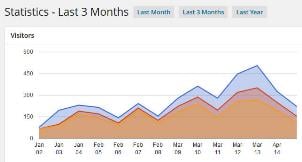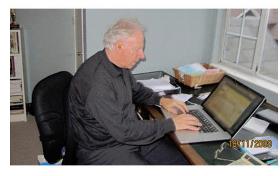Back on March 5th, my colleague Enoch Hale posted a challenge on his blog:
“I want to pose an open challenge: Post an out-of-the-box question about teaching and learning each day for 30 days.”
 I took him up on his challenge…though I suggested “thirty work days”…to which he agreed. Over the past six weeks, we have each posted 58 questions – 29 each. In the process, we have both improved in our blogging. The biggest “challenge” in a 30-Day Challenge is blogging consistently each work day. It stretched me time wise and intellectually…but it also was a lot of fun. Enoch and I fed off of each other. And…not surprisingly, when one blogs daily, one’s readership increases. I topped a hundred page views for Day 20 (The New Nomads) and Day 25 (The Training Wheel Question).
I took him up on his challenge…though I suggested “thirty work days”…to which he agreed. Over the past six weeks, we have each posted 58 questions – 29 each. In the process, we have both improved in our blogging. The biggest “challenge” in a 30-Day Challenge is blogging consistently each work day. It stretched me time wise and intellectually…but it also was a lot of fun. Enoch and I fed off of each other. And…not surprisingly, when one blogs daily, one’s readership increases. I topped a hundred page views for Day 20 (The New Nomads) and Day 25 (The Training Wheel Question).
Enoch noted on his first day that questions can drive thinking forward. Answers stop thinking, but questions keep thinking moving. Over the past six weeks, I have paid more attention to questions being asked. I have started following Warren Berger, author of A More Beautiful Question. Maryellen Weimer blogged last month about “The Art of Asking Question,” suggesting that if we want students to ask thoughtful questions, we have to model that ourselves.
 Tony Bates out of Canada has been asking thoughtful questions for 45 years about distance and online learning. His post yesterday took me by surprise – “Time to retire from online learning?”
Tony Bates out of Canada has been asking thoughtful questions for 45 years about distance and online learning. His post yesterday took me by surprise – “Time to retire from online learning?”
First, Tony turned 75 this week (congratulations!). He has decided he has reached the point in his life to stop nearly all professional activities. At 75, he feels he has reached the right to stop (…which could mean I now have 11 years to continue, since I will soon turn 64…). He wants to stop when he is still at his best. He has not taught a full course in ten years, and:
“Given the pace of change, it is dangerous for a consultant to become adrift from the reality of teaching and management. It’s time to hang up my boots before I get really hurt (or more importantly, really hurt others).”
Tony then expressed some concerns about the future of higher education and teaching. Four quotes hit me…and the emphasis below is mine:
“…It’s a full-time job just to keep abreast of new developments in online and distance learning, and this constant change is not going to go away. It’s tempting to say that it’s only the technology that changes; the important things – teaching and learning – don’t change much, but I don’t believe that to be true, either. Teaching in higher education is about to go through as major a revolution as one can imagine. This is not going to be easy; indeed it could get brutal…
…this is a field that needs full-time, professional application, and very hard work, and I just don’t have the energy any more to work at that level. To put it simply, this is not a profession where you can be half in and half out. Dabbling in online learning is very dangerous (politicians please note)…
…And then there’s MOOCs. I can’t express adequately just how pissed off I am about MOOCs – not the concept, but all the hubris and nonsense that’s been talked and written about them. At a personal level, it was as if 45 years of work was for nothing. All the research and study I and many others had done on what makes for successful learning online were totally ignored, with truly disastrous consequences in terms of effective learning for the vast majority of participants who took MOOCs from the Ivy League universities. Having ignored online learning for nearly 20 years, Stanford, MIT and Harvard had to re-invent online learning in their own image to maintain their perceived superiority in all things higher educational. And the media fell for it, hook, line and sinker. This is a battle I no longer want to fight – but it needs fighting…
…Lastly, I am concerned that the computer scientists seem to be taking over online education. Ivy League MOOCs are being driven mainly by computer scientists, not educators. Politicians are looking to computer science to automate learning in order to save money. Computer scientists have much to offer, but they need more humility and a greater willingness to work with other professionals, such as psychologists and teachers, who understand better how learning operates. This is a battle that has always existed in educational technology, but it’s one I fear the educators are losing…”
I need to reflect on Tony’s post much more, but his very personal reflection lays the groundwork for many more thoughtful questions. It brought to my mind my final question for THIS 30-day Challenge:
Day 30 – What are the questions I did not ask but should have?
There are obviously many more than thirty good questions left to ask…so while this challenge has ended, the challenge for higher education is only getting more intense. If more educators joined the open questioning within the blogosphere. maybe we can win some battles. As Tony noted, this is not a field you can be half in and half out.
Thoughts?
{Graphics: Bates}

Congratulations on making it to your 30 day goal! To comment on your blog, we cannot be half-in or half-out when dealing with education and technology. In teaching an online class (I have taught many), not understanding the technological platform (Blackboard, Moodle, Angel… etc) will not serve anyone’s purpose if the goal is to create a learning environment. However, in reality, I do not think it is wise to do anything “halfway,” you have to be all “in” to achieve optimal results. For example, a 15 minute work-out will not yield the same results as a 30 minute work-out… and your 30 day challenge would not be the same if you stopped at 15 days!
Thanks for sharing these thoughts.